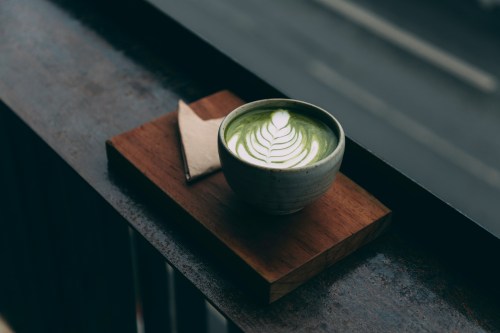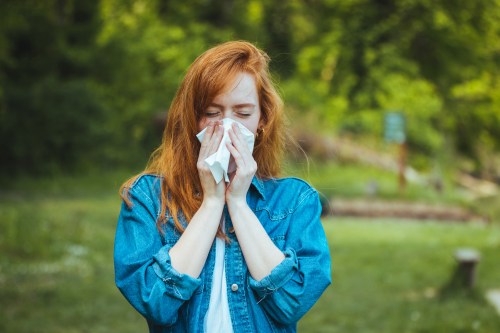Matcha has long been viewed as coffee’s healthier cousin thanks to its antioxidant-rich brew and other perks. But a new viral post suggests it’s not the best choice for everyone.
Experts in This Article
owner of Keatley Medical Nutrition Therapy
registered dietitian, integrative nutrition coach, and author
associate professor of pharmacology and toxicology at Michigan State University.
medical toxicologist and co-medical director of the National Capital Poison Center
nutritionist and registered dietitian based in San Francisco, California
“If you're anemic or low-iron, stop drinking matcha,” wrote Twitter/X user @saweeeties. “It blocks iron absorption and will have you fainting and passing out in public.” The original post author also added this note: “This keeps happening to me and it’s kind of scary. Unfortunately I refuse to give up matcha tho.”
Let's just say, people in the comments had some thoughts: Some said the original poster was right, and others claimed that this is “fear-mongering.” We wanted to know what the truth was, too, so we tapped nutritionists and toxicologists about this new matcha claim, and here's the real connection between the drink and iron.
What is matcha, and how does it impact your body?
Matcha is a powdered form of green tea made from ground young tea leaves, explains Scott Keatley, RD, co-owner of Keatley Medical Nutrition Therapy. “It’s especially concentrated in antioxidants, particularly catechins like EGCG, and also contains caffeine, L-theanine, and other plant compounds,” he says.
This popular green powder can actually affect the body in several ways. “The caffeine can boost alertness and focus,” says Jessica Cording, RD, author of The Little Book of Game-Changers: 50 Healthy Habits For Managing Stress & Anxiety. “The L-theanine in matcha helps to promote relaxation and calm, and the antioxidants and other compounds have been linked to a reduced risk of certain cancers.”1,2 Cording also says that matcha is a great option for people who want the alertness you can get from coffee, but without the jitters.
But matcha also plays a role in your physical well-being. Evidence suggests that matcha may support cardiovascular health by lowering levels of LDL (“bad”) cholesterol and keeping veins flexible.3 “Some studies also indicate modest support for increased fat burning,” Keatley says.4
Does matcha really affect iron absorption?
The short answer: Yes-ish. “There are compounds called tannins in matcha that can interfere with iron absorption,” says Jamie Alan, PhD, an associate professor of pharmacology and toxicology at Michigan State University. “However, I would expect this interaction to be slight and not clinically relevant in most cases.”
Let’s back up a moment: Iron is an essential element for human life and nutrition. “Humans obtain iron from dietary sources, including heme iron (derived from animal products) and non-heme iron (derived from fruits, vegetables, and legumes),” says Kelly Johnson-Arbor, MD, a toxicologist at MedStar Health. “Once consumed, iron is absorbed into the human body through the small intestine.”
But iron absorption in your body can be affected by several things in your diet. “Consumption of vitamin C can increase iron absorption—this is why some iron supplements contain vitamin C, or ascorbic acid,” Dr. Johnson-Arbor says. “On the other hand, consumption of calcium can decrease iron absorption.”
Polyphenols, which are naturally occurring plant-based compounds known for their antioxidant and anti-inflammatory effects, are also known to interfere with iron absorption by binding to iron and forming a complex that can’t be digested or absorbed by the body, Dr. Johnson-Arbor explains.
“Polyphenols are found in numerous foods, including fruit, vegetables, grains, and tea—including matcha,” says Dr. Johnson-Arbor. “Because of this, consumption of matcha and other types of tea may affect iron absorption.” This is more of a potential issue with non-heme iron. The impact is less significant when the iron comes from animal sources (aka heme iron), Keatley adds.
Still, Cording emphasizes that it’s a little extreme to suggest that you’ll pass out if you have matcha, even if you have low iron levels or anemia to begin with. Green tea has messed with iron levels in the past, but it tends to be under unusual, very specific circumstances.
Dr. Johnson-Arbor points to a 2016 case study of a 48-year-old man who was diagnosed with anemia and iron deficiency. Healthcare providers couldn’t figure out what was behind this until he admitted that he drank more than 1,500 milliliters (or nearly 51 ounces) of green tea on a near-daily basis for 20 years. Once he was treated with iron supplements and stopped drinking green tea, his anemia improved. (Just FYI, the case report doesn’t say that he passed out or fainted at any time due to anemia, though.)5
So, should people with iron deficiency or anemia stop drinking matcha?
Nope, but it’s a good idea to be smart about the timing of your matcha, says Sonya Angelone, MS, RDN, a nutritionist and registered dietitian based in San Francisco, California.
“Don’t drink matcha near a meal containing iron or near iron supplements,” she says. “Separate them by at least one hour.” She also recommends keeping tabs on how much matcha you have. “Limit matcha to a couple of cups per day,” she explains.
But a lot of your matcha intake will also depend on your personal situation. “If someone’s iron levels are severely deficient or they’re under treatment for anemia, it’s worth temporarily avoiding matcha to maximize absorption,” Keatley says.
Ultimately, Cording explains that moderation—and smart timing—is key. “If someone is having a matcha a day, I’m not concerned,” she says. “But it’s probably not the best if you’re drinking matcha around the clock and close to meals.”
- Dashwood, Roderick, and Francesco Visioli. “l-Theanine: From Tea Leaf to Trending Supplement – Does the Science Match the Hype for Brain Health and Relaxation?” Nutrition Research, vol. 134, Jan. 2025, pp. 39–48. https://doi.org/10.1016/j.nutres.2024.12.008. ↩︎
- Sokary, Sara, et al. “Testing the Anticancer Effect of Matcha Using Zebrafish as an Animal Model.” Nutrients, vol. 15, no. 10, May 2023, p. 2369. https://doi.org/10.3390/nu15102369. ↩︎
- Xu, Renfan, et al. “Effect of Green Tea Consumption on Blood Lipids: A Systematic Review and Meta-analysis of Randomized Controlled Trials.” Nutrition Journal, vol. 19, no. 1, May 2020, https://doi.org/10.1186/s12937-020-00557-5. ↩︎
- Willems, Mark Elisabeth Theodorus, et al. “Matcha Green Tea Drinks Enhance Fat Oxidation During Brisk Walking in Females.” International Journal of Sport Nutrition and Exercise Metabolism, vol. 28, no. 5, Jan. 2018, pp. 536–41. https://doi.org/10.1123/ijsnem.2017-0237. ↩︎
- Fan, Frank S. “Iron Deficiency Anemia Due to Excessive Green Tea Drinking.” Clinical Case Reports, vol. 4, no. 11, Oct. 2016, pp. 1053–56. https://doi.org/10.1002/ccr3.707. ↩︎
Sign Up for Our Daily Newsletter
Get all the latest in wellness, trends, food, fitness, beauty, and more delivered right to your inbox.
Got it, you've been added to our email list.








